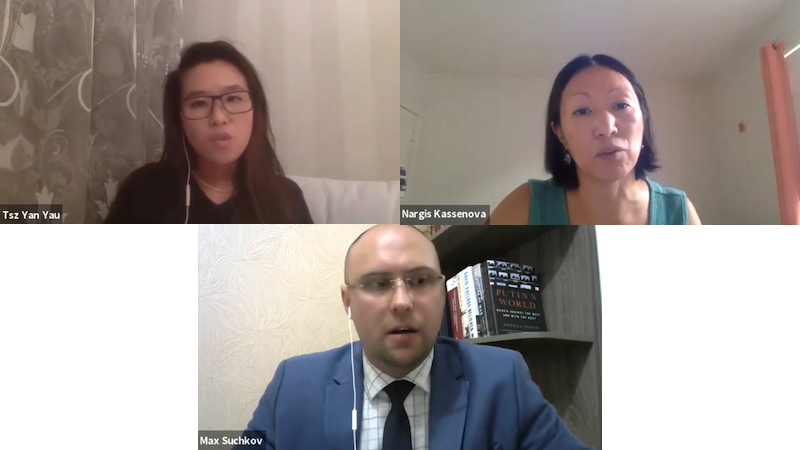
Experts Niva Yau Tsz Yan, Maxim Suchkov, and Nargis Kassenova on the Afghanistan Crisis
By Alex Avaneszadeh, MALD 2023 Candidate, The Fletcher School
On September 23, 2021, the Fletcher Russia and Eurasia Program hosted a virtual panel discussion titled “Crisis in Afghanistan: Repercussions for Russia, China, and Central Asia,” in the wake of the Taliban’s seizure of power after the U.S. evacuation of Afghanistan. The three scholars on the panel discussed the reactions of their respective regions of focus to the Taliban’s takeover, as well as that of other countries across the Middle East and South Asia. The panelists addressed the new geopolitical dynamics, the foreign policy calculations of each country, and the evolving nature of the Taliban government.
Niva Yau Tsz Yan, a researcher at the OSCE Academy at Bishkek and a fellow at the Eurasia Program of the Foreign Policy Research Institute in Philadelphia, spoke about the Chinese government’s security concerns and economic interests in this new regional context.
She highlighted China’s request that an inclusive Afghan government is formed and that it cuts ties with international terrorist organizations, disassociates itself with the East Turkestan movement in China’s Xinjiang province, and fosters good relations with its Central Asian neighbors. Though China has framed the U.S. withdrawal as humiliating, Yau explained that China has recently tried “not to mention the world ‘Taliban’ at all and replaces [the term] with ‘the new government of Afghanistan’,” implying that the Chinese public sentiment towards the Taliban is monitored and is of importance to the state.
“China is requesting that the United States must remove its sanctions on Taliban officials to allow for a more secure and feasible opportunity to deliver humanitarian aid, calling for a regional approach to addressing border security and counterterrorism,” said Yau. The admission of Iran into the Shanghai Cooperation Agreement is also expected to have an effect on managing the new geopolitical dynamics in concert with the organization’s members.
Nargis Kassenova, Senior Fellow and Director of the Program on Central Asia at the Davis Center for Russian and Eurasian Studies at Harvard University, described the various reactions of the Central Asian countries. She outlined each state’s reasons for optimism or caution regarding formal recognition of the Taliban, including that the Central Asian states will to have to continue to combat narcotics trafficking coming from Afghanistan.
Kassenova stated that “the illegal drug trade is one of the largest sources of income for the Taliban; and with limited sources of income, the Taliban will likely expand its opium trade over time.” Regardless, Kassenova pointed out that Turkmenistan has remained on speaking terms with the Taliban. Uzbekistan welcomes the creation of an interim government and negotiations with the Taliban, as the Uzbek government waits for the situation to stabilize to build trade and transit corridors. Similarly, Kazakhstan and Kyrgyzstan continue to monitor how the situation evolves before getting entrenched in formal proceedings.
On the other hand, Tajikistan is “surprisingly proactive,” said Kassenova, as President Emomali Rahmon offered to host the Taliban and Panjshir resistance front for talks in Dushanbe with Pakistan’s help. With the exception of Tajikistan, each of the Central Asian countries have been hesitant to accept Afghan refugees.
In her concluding remarks, Kassenova suggested that “the Central Asian states can play a constructive role of bringing humanitarian aid to Afghanistan,” as there is “no political cost to do this.” However, the concern of an ideological threat looms, as both Central Asia and Russia are aware of the possible spillover of violent extremism from Afghanistan.
Finally, Maxim Suchkov, Senior Fellow at the Laboratory for International Trends Analysis and Associate Professor of Applied International Analysis at the Moscow State Institute of International Relations (MGIMO) touched upon the mixed reactions within the Russian government.
Suchkov outlined three main topics of discourse in Russia: schadenfreude surrounding America’s failure of nation-building in Afghanistan, criticism of the former Afghan government under President Ashraf Ghani, and concerns about Russia’s security on its southern flank. Suchkov also addressed four issues around Russia’s position on the Taliban, including drug trafficking, regional instability, in-country diplomatic security, and extremism.
“As of now, Russian diplomats and diplomatic compounds remain untouched in the wake of the Taliban takeover, though Moscow remains in wait-and-see mode and will not jump before everyone else does on recognizing the Taliban,” said Suchkov. At the moment, Russian policymakers are careful not to provide a high level of legitimacy to the Taliban.
